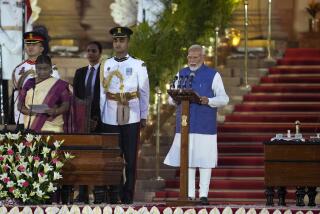Benazir Bhutto Gets Second Chance to Lead Pakistan : Asia: She reclaims prime minister’s post after defeating opponent in National Assembly vote.
- Share via
ISLAMABAD, Pakistan — Benazir Bhutto reclaimed the prime minister’s post Tuesday, getting her second chance in five years to try to do something about the social and economic troubles of this impoverished nation.
But her political honeymoon is expected to be briefer than in 1988, when her dramatic rise to power restored democracy and set off widespread celebrations.
“Pakistan is passing through a tough period. We are facing severe economic problems,” Bhutto told the National Assembly after she was elected prime minister, 121 to 72, over the man who replaced her in 1990--Nawaz Sharif, leader of the conservative Pakistan Muslim League.
Bhutto was congratulated by legislators at the assembly and later at the ornate office of the president, where she was sworn in. But her return to power did not bring ordinary Pakistanis out into the streets.
Many are frustrated with politicians, including Bhutto, who have been unable to form effective governments or ease endemic poverty in the nation of 120 million people.
Average annual income, $400 a person, has not been rising, and no more than a quarter of Pakistanis can read or write. Powerful drug barons also are challenging government authority in some regions.
“The people of Pakistan are no longer interested in a change of faces. They want improvements and reforms,” said Bhutto, wearing an Islamic-style white scarf.
Her liberal Pakistan People’s Party won the most seats in elections Oct. 6, but not an absolute majority, and it had to form a coalition government that includes several smaller parties and independents.
Bhutto, the first woman to lead a modern Muslim state when she ruled in 1988-90, is expected to have a tough time surviving a full five-year term.
Her previous government was dismissed on charges of corruption and misrule after only 20 months. She was credited with restoring civil rights, but she battled repeatedly with the military and bureaucrats and did not institute any major programs.
The Muslim League is expected to be a strong opposition, although Sharif said he had no intention of trying to undermine the new government.
Bhutto, 40, was educated at Harvard and Oxford before returning to Pakistan to oppose the military dictatorship of Mohammed Zia ul-Haq, the man who ousted her father as prime minister and ordered him hanged in 1979.
Bhutto comes from the country’s most prominent family. Her husband, mother and father-in-law also are members of Parliament, which is dominated by wealthy landowners like the Bhuttos.
She said she wants to repair relations with the United States, which cut off aid in 1990 over concerns about Pakistan’s nuclear weapons program.
More to Read
Sign up for Essential California
The most important California stories and recommendations in your inbox every morning.
You may occasionally receive promotional content from the Los Angeles Times.













